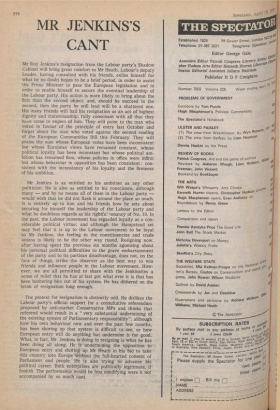MR JENKINS'S CANT
Mr Roy Jenkins's resignation from the Labour party's Shadow Cabinet will bring great comfort to Mr Heath. Labour's deputy Leader, having consulted with his friends, exiles himself for what he no doubt hopes to be a brief period, in order to assist the Prime Minister to pass the European legislation and in order to enable himself to secure the eventual leadership of the Labour party. His action is more likely to bring about the first than the second object; and, should he succeed in the second, then the party he will lead will be a shattered one. His many friends will hail his resignation as an act of highest dignity and statesmanship, fully consonant with all that they have come to expect of him. They will point to the man who voted in favour of the principle of entry last October and forget about the man who voted against the second reading of the European Communities Bill this February. They will praise the man whose European votes have been inconsistent but whose European views have remained constant, whose political loyalty has been inconstant but whose political ambition has remained firm, whose policies in office were infirm but whose behaviour in opposition has been consistent : consistent with the inconstancy of his loyalty and the firmness of his ambition.
Mr Jenkins is as entitled to his ambition as any other politician. He is also as entitled to his conscience, although many — and by no means all of them in the Labour party — would wish that he did not flash it around the place so much. It is entirely up to him and his friends how he sets about securing for himself the leadership of the Labour party and what he doubtless regards as his rightfu' tenancy of No. 10. In the past, the Labour movement has regarded loyalty as a considerable political virtue; and although the Hampstead set may feel that it is up to the Labour movement to be loyal to Mr Jenkins, the feeling in the constituencies and trade unions is likely to be the other way round. Resigning now. after having spent the previous six months agonising about his personal political difficulties to the grave embarrassment of the party and to its partisan disadvantage, does not, on the face of things, strike the observer as the best way to win friends and influence people in the Labour movement. However, we are all permitted to share with the Jenkinsites a sense of relief that he has at last got what ever it is that has been bothering him out of his system. He has dithered on the brink of resignation long enough.
The pretext for resignation is distinctly odd. He dislikes the Labour party's official support for a consultative referendum proposed by anti-market Conservative MPs and thinks that referend would result in a "very substantial undermining of the existing system of Parliamentary responsibility"; although how his own behaviour now and over the past few months, has been shoring up that system is difficult to see, or how European entry will do anything but undermine it for good. What, in fact, Mr. Jenkins is doing in resigning is what he has been doing all along. He is undermining the opposition to European entry and shoring up Mr Heath in his bid to take this country into Europe '{Vithout the full-hearted consent of Parliament and people. He is also trying to advance his political career. Both enterprises are politically legitimate, if foolish. The performance would be less unedifying were it not accompanied by so much cant.


































 Previous page
Previous page